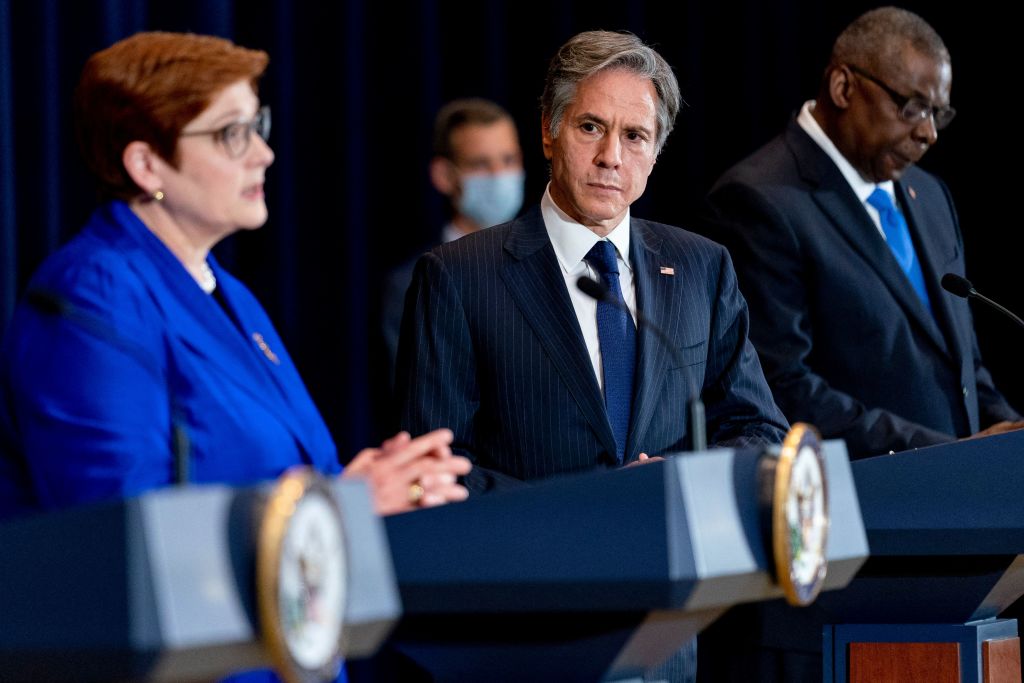Expert predicts a 'very hard' period between U.S. and France following Australian submarine deal


A free daily email with the biggest news stories of the day – and the best features from TheWeek.com
You are now subscribed
Your newsletter sign-up was successful
An expert on French-American relations predicts a "very hard" period in the friendship between the U.S. and France in the wake of the former's nuclear submarine partnership with Australia, The New York Times reports.
"This looks like a new geopolitical order without binding alliances," said the expert, Nicole Bacharan. "To confront China, the United States appears to have chosen a different alliance, with the Anglo-Saxon world confronting France."
The U.S., U.K.,and Australia deal is at odds with one made between France and Australia in 2016, intended to provide the latter with "conventional, less technologically sophisticated submarines," writes the Times. That contract has now collapsed, in favor of the U.S. and U.K. arrangement. Paris has since claimed the new deal to be a "stab in the back," and one that reminds French Foreign Minister Jean-Yves Le Drian of former President Donald Trump.
The Week
Escape your echo chamber. Get the facts behind the news, plus analysis from multiple perspectives.

Sign up for The Week's Free Newsletters
From our morning news briefing to a weekly Good News Newsletter, get the best of The Week delivered directly to your inbox.
From our morning news briefing to a weekly Good News Newsletter, get the best of The Week delivered directly to your inbox.
"This brutal, unilateral and unpredictable decision reminds me a lot of what Mr. Trump used to do," Le Drian told Franceinfo radio. "I am angry and bitter. This isn't done between allies."
On Thursday, Secretary of State Antony Blinken attemped to soothe some of that ire, calling France a "vital partner" in the Indo-Pacific region, and one that Washington will continue to work with.
"We cooperate incredibly closely with France on many shared priorities in the Indo-Pacific but also beyond around the world. We're going to continue to do so. We place fundamental value on that relationship, on that partnership," said Blinken. Read more at The New York Times.
A free daily email with the biggest news stories of the day – and the best features from TheWeek.com
Brigid Kennedy worked at The Week from 2021 to 2023 as a staff writer, junior editor and then story editor, with an interest in U.S. politics, the economy and the music industry.
-
 What are the best investments for beginners?
What are the best investments for beginners?The Explainer Stocks and ETFs and bonds, oh my
-
 What to know before filing your own taxes for the first time
What to know before filing your own taxes for the first timethe explainer Tackle this financial milestone with confidence
-
 The biggest box office flops of the 21st century
The biggest box office flops of the 21st centuryin depth Unnecessary remakes and turgid, expensive CGI-fests highlight this list of these most notorious box-office losers
-
 Key Bangladesh election returns old guard to power
Key Bangladesh election returns old guard to powerSpeed Read The Bangladesh Nationalist Party claimed a decisive victory
-
 Epstein files topple law CEO, roil UK government
Epstein files topple law CEO, roil UK governmentSpeed Read Peter Mandelson, Britain’s former ambassador to the US, is caught up in the scandal
-
 Iran and US prepare to meet after skirmishes
Iran and US prepare to meet after skirmishesSpeed Read The incident comes amid heightened tensions in the Middle East
-
 EU and India clinch trade pact amid US tariff war
EU and India clinch trade pact amid US tariff warSpeed Read The agreement will slash tariffs on most goods over the next decade
-
 Israel retrieves final hostage’s body from Gaza
Israel retrieves final hostage’s body from GazaSpeed Read The 24-year-old police officer was killed during the initial Hamas attack
-
 China’s Xi targets top general in growing purge
China’s Xi targets top general in growing purgeSpeed Read Zhang Youxia is being investigated over ‘grave violations’ of the law
-
 Panama and Canada are negotiating over a crucial copper mine
Panama and Canada are negotiating over a crucial copper mineIn the Spotlight Panama is set to make a final decision on the mine this summer
-
 Why Greenland’s natural resources are nearly impossible to mine
Why Greenland’s natural resources are nearly impossible to mineThe Explainer The country’s natural landscape makes the task extremely difficult
